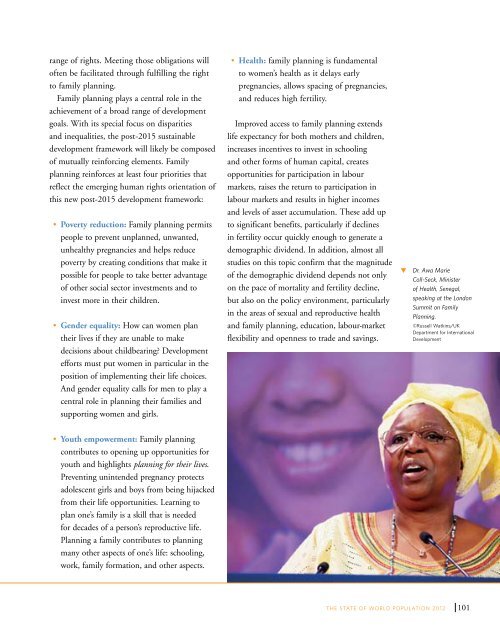State of World Population 2012 - Country Page List - UNFPA
State of World Population 2012 - Country Page List - UNFPA
State of World Population 2012 - Country Page List - UNFPA
Create successful ePaper yourself
Turn your PDF publications into a flip-book with our unique Google optimized e-Paper software.
ange <strong>of</strong> rights. Meeting those obligations will<br />
<strong>of</strong>ten be facilitated through fulfilling the right<br />
to family planning.<br />
Family planning plays a central role in the<br />
achievement <strong>of</strong> a broad range <strong>of</strong> development<br />
goals. With its special focus on disparities<br />
and inequalities, the post-2015 sustainable<br />
development framework will likely be composed<br />
<strong>of</strong> mutually reinforcing elements. Family<br />
planning reinforces at least four priorities that<br />
reflect the emerging human rights orientation <strong>of</strong><br />
this new post-2015 development framework:<br />
• Poverty reduction: Family planning permits<br />
people to prevent unplanned, unwanted,<br />
unhealthy pregnancies and helps reduce<br />
poverty by creating conditions that make it<br />
possible for people to take better advantage<br />
<strong>of</strong> other social sector investments and to<br />
invest more in their children.<br />
• Gender equality: How can women plan<br />
their lives if they are unable to make<br />
decisions about childbearing Development<br />
efforts must put women in particular in the<br />
position <strong>of</strong> implementing their life choices.<br />
And gender equality calls for men to play a<br />
central role in planning their families and<br />
supporting women and girls.<br />
• Health: family planning is fundamental<br />
to women’s health as it delays early<br />
pregnancies, allows spacing <strong>of</strong> pregnancies,<br />
and reduces high fertility.<br />
Improved access to family planning extends<br />
life expectancy for both mothers and children,<br />
increases incentives to invest in schooling<br />
and other forms <strong>of</strong> human capital, creates<br />
opportunities for participation in labour<br />
markets, raises the return to participation in<br />
labour markets and results in higher incomes<br />
and levels <strong>of</strong> asset accumulation. These add up<br />
to significant benefits, particularly if declines<br />
in fertility occur quickly enough to generate a<br />
demographic dividend. In addition, almost all<br />
studies on this topic confirm that the magnitude<br />
<strong>of</strong> the demographic dividend depends not only<br />
on the pace <strong>of</strong> mortality and fertility decline,<br />
but also on the policy environment, particularly<br />
in the areas <strong>of</strong> sexual and reproductive health<br />
and family planning, education, labour‐market<br />
flexibility and openness to trade and savings.<br />
t<br />
Dr. Awa Marie<br />
Coll-Seck, Minister<br />
<strong>of</strong> Health, Senegal,<br />
speaking at the London<br />
Summit on Family<br />
Planning.<br />
©Russell Watkins/UK<br />
Department for International<br />
Development<br />
• Youth empowerment: Family planning<br />
contributes to opening up opportunities for<br />
youth and highlights planning for their lives.<br />
Preventing unintended pregnancy protects<br />
adolescent girls and boys from being hijacked<br />
from their life opportunities. Learning to<br />
plan one’s family is a skill that is needed<br />
for decades <strong>of</strong> a person’s reproductive life.<br />
Planning a family contributes to planning<br />
many other aspects <strong>of</strong> one’s life: schooling,<br />
work, family formation, and other aspects.<br />
THE STATE OF WORLD POPULATION <strong>2012</strong><br />
101
















